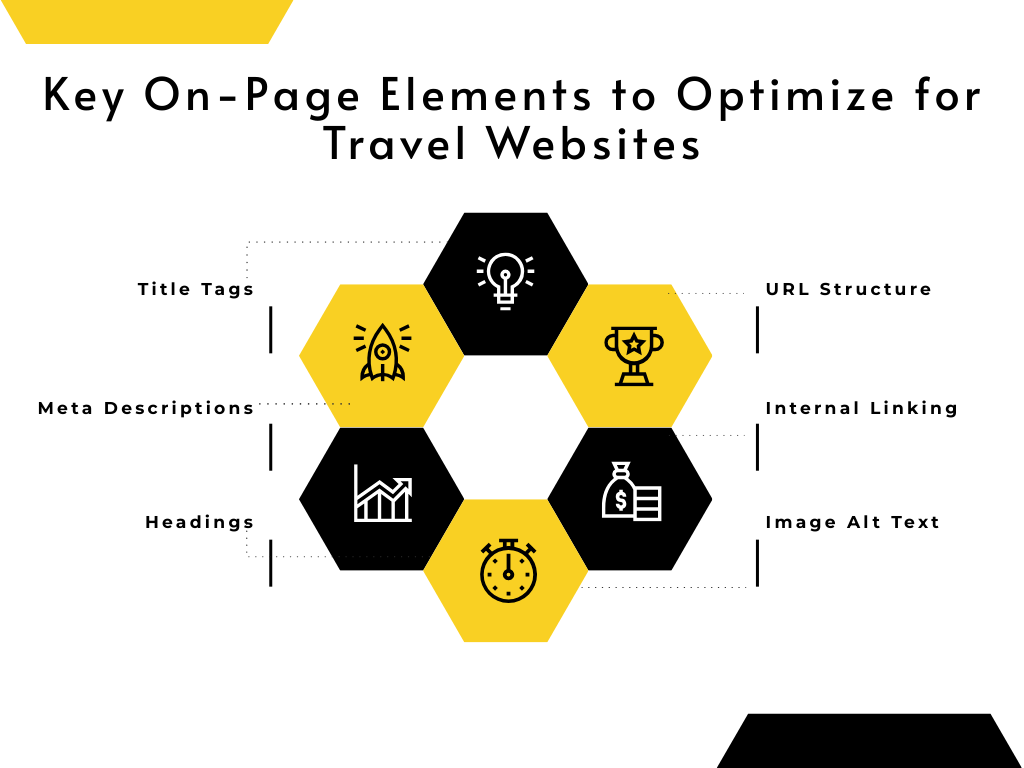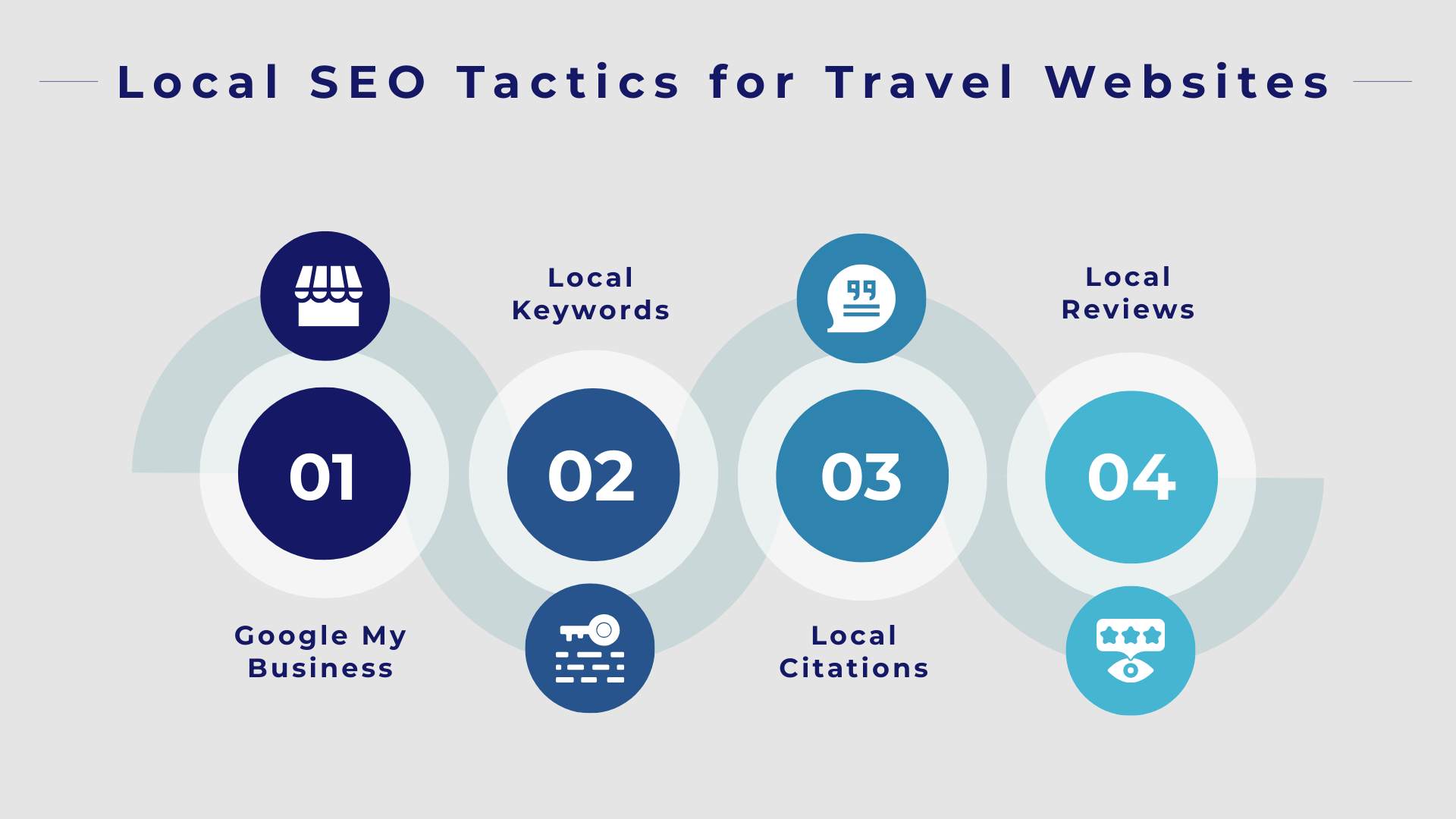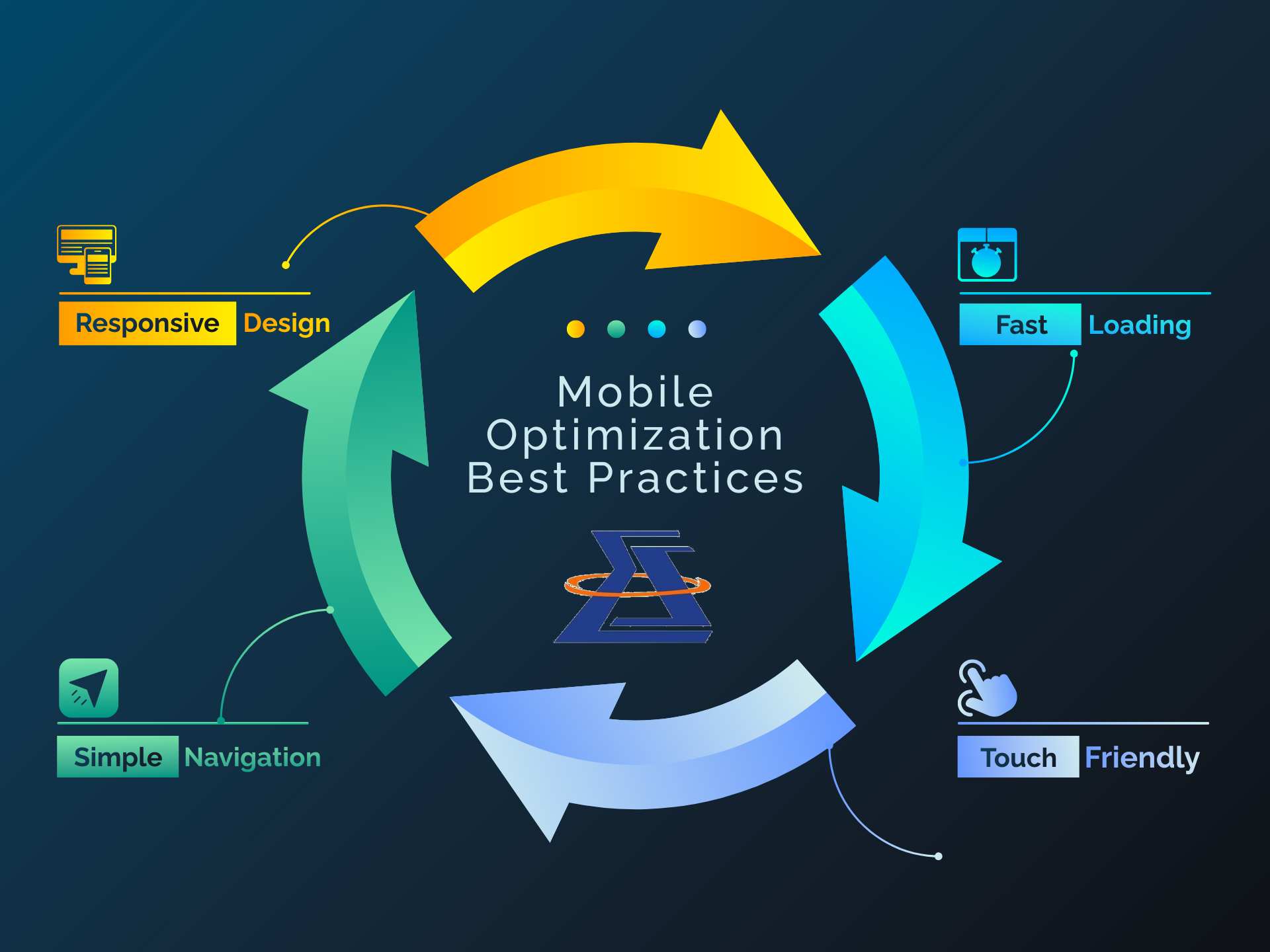Introduction: Why SEO is Essential for the Modern Travel Business
When it comes to planning the next journey, millions of tourists today type their queries into search engines. But how do you embrace this change or make sure that your travel website is unique to the other many out there? In essence, what if your site could be ranked strategically and acquire more unique visitors organically? This is exactly what digital marketing for travel agencies does.
This blog reveals 15 advanced SEO strategies that can help travel websites improve their search rankings, increase organic traffic, and ultimately drive more bookings. From foundational tactics like keyword research to technical optimizations like schema markup, these techniques will elevate your SEO game.
This guide is aimed at travel agency owners, digital marketers, SEO specialists, content creators, travel bloggers, and anyone in the travel industry looking to boost their SEO and outshine competitors.
What is SEO, and why is it essential for travel websites?
Search Engine Optimization, or SEO, is the skilled process of arranging and adjusting elements in your travel site to improve its presence on search engines such as Google, Bing, and others. When your website is on top, it will be frequently accessed by people who are interested in seeking travel facilities such as flights, accommodation, or a certain place.
The importance of SEO for travel websites can be realized from the fact that it helps bring more people to your site, which in turn helps with more bookings. When you are in the travel niche, where competition can be cutthroat, it is always essential to ensure you target the right audience, get the right traffic, and, therefore, grow your sales and business.
Start with a Comprehensive SEO Audit: Analyze Your Website’s Health
Why is an SEO Audit Essential for Your Travel Website’s Success?
- Understanding Your Site’s Performance:An SEO audit for travel websites is a diagnostic examination of your website. It shows issues that may be causing a decline in ranking position, such as slow page speed, Gopher links, or missing meta tags.
- Key Areas to Focus On:
- Technical SEO: Focus on crawling issues, mobile-friendliness, speed of the site loading, HTTPS security, and structured data implementation.
- Content Audit: Assess keyword usage, content quality, and internal linking.
- Backlink Profile: Analyze the quantity and quality of external links pointing to your site.
- User Experience (UX): Ensure easy navigation, clear calls to action, and engaging design.
- Tools for Audit:
- Google Search Console for crawl errors and indexing issues.
- SEMrush, Ahrefs, and Screaming Frog for in-depth technical analysis.
- Outcome: A clear understanding of your site’s weaknesses, allowing you to fix critical issues and lay the groundwork for future SEO success.
Targeted Keyword Research: Understand What Your Audience Is Searching For
The Foundation of Successful SEO Strategy for Travel Websites
- What is Keyword Research?: Travel keyword research is the identification of the words that people use to search for travel information on the web. As a result, you are ready to produce what your audience is searching for with the right keywords they use to search and rank high.
- Types of Keywords:
- Head Keywords: Broad, high-volume keywords (e.g., “best travel destinations”).
- Long-tail Keywords: More specific and lower competition (e.g., “best family vacations in Europe under $3000”).
- Local Keywords: Focus on geolocation-based searches (e.g., “things to do in Rome this summer”).
- Keyword Research Tools:
- Google Keyword Planner for basic keyword data.
- SEMrush, Ahrefs, and Ubersuggest for in-depth keyword analysis.
- Google Trends to see seasonal fluctuations and search interest.
- Outcome: A solid list of target keywords that will help your content rank better and attract highly relevant traffic to your website.
Optimize On-Page SEO: Craft Pages That Rank and Engage
The Power of On-Page SEO Services for Travel Websites
- On-Page SEO Defined: On-page SEO involves tweaking the technical parameters of the page, including meta tags, title, meta description, focus keywords, and other parameters, to improve its ranking position in search engine results.
- Key On-Page Elements to Optimize:
- Title Tags: Make your title tags compelling and include target keywords.
- Meta Descriptions: Craft engaging descriptions that summarize the page’s content and include a call-to-action (CTA).
- Headings (H1, H2, etc.): Structure your content logically with relevant keywords in the headings.
- URL Structure: Use clean and descriptive URLs that include relevant keywords (e.g., /best-vacation-places-in-2024).
- Internal Linking: Link to other pages within your website to keep users engaged and improve your site’s overall SEO.
- Image Alt Text: Use descriptive text for all images to improve visibility in Google Image Search and enhance accessibility.
- Outcome: On-page SEO optimization improves both search rankings and user experience, leading to higher engagement and more bookings.
Improve User Experience (UX): Keep Visitors Engaged and Happy
Why is user experience a Critical SEO Factor?
- Google’s Focus on User Signals: To Google, user experience is significant, and websites with this quality are encouraged. Other attributes, such as bounce rate and time on site, as well as page load time, also matter with ranking.
- UX Best Practices for Travel Websites:
- Responsive Design: Ensure your website works perfectly across all devices, especially mobile, as many travelers browse on smartphones.
- Site Speed: Aim for page load times under 3 seconds. Slow websites lead to high bounce rates and hurt rankings.
- Clear Navigation: Make it easy for users to find information and book trips with intuitive navigation and well-organized content.
- Engaging Visuals: Use high-quality, relevant images that highlight the travel experiences you offer.
- Tools to Test UX:
- Google PageSpeed Insights to measure page load speed.
- Hotjar for heatmaps to understand user behavior on your site.
- Google Mobile-Friendly Test to ensure your website is optimized for mobile users.
- Outcome: A user-friendly website encourages visitors to explore more, leading to increased engagement and bookings.
Leverage Local SEO: Target Travelers in Specific Locations
Why Local SEO is Essential for Travel Websites?
- Local Search Trends: Given that people often look for particular places, points of interest, or services, local SEO remains important for travel-related websites.
- Local SEO Tactics:
- Google My Business: Create and optimize your profile to appear in local searches and Google Maps.
- Local Keywords: Use location-specific keywords (e.g., “best hotels in London” or “things to do in Paris”).
- Local Citations: Ensure your business is listed in local directories like Yelp, TripAdvisor, and local tourism boards.
- Encourage Local Reviews: Positive reviews on platforms like Google and TripAdvisor boost credibility and rankings
- Outcome: Optimizing for local SEO increases your website’s visibility in location-specific searches, attracting tourists who are ready to book.
Create High-Quality, Informative Content: Be the Go-To Resource for Travelers
Why is content king in SEO strategy for travel websites?
- Content that Answers Questions: Such websites can do very well if they publish useful, detailed information that the traveler is looking for. High quality and high levels of information can establish trust between users, search engines, and the site itself.
- Types of Content to Create:
- Destination Guides: Offer in-depth, well-researched guides on popular destinations.
- Itinerary Suggestions: Create sample itineraries for different types of travelers (e.g., solo, families, couples).
- Travel Tips: Provide valuable advice on budgeting, packing, or how to avoid common travel mistakes.
- Customer Testimonials & Case Studies: Feature real-life stories and experiences from past travelers to build trust.
- Content Optimization: Make sure that each piece of content is keyworded correctly, uses simple language, and contains links to your website’s pages. For, businesses need to adopt accurate and trusted travel content marketing strategies.
- Outcome: Content that educates and engages users not only improves SEO rankings but also increases conversions by positioning your website as an authority in the travel space.
Build High-Quality Backlinks: Boost Your Site’s Authority
Why Backlinks are Critical for SEO Success?
- The Power of Backlinks: Backlinks (links from other websites pointing to your site) are one of the most important ranking factors. High-quality backlinks from reputable sites increase your domain authority and help improve your rankings.
- How to Earn Backlinks:
- Guest Blogging: Write for reputable travel blogs and include links back to your website.
- Influencer Partnerships: Work with travel influencers to get mentions and backlinks.
- Linkable Assets: Create valuable content like detailed guides, tools, or infographics that others want to link to.
- Tools to Track Backlinks:
- Ahrefs and SEMrush for monitoring backlinks and competitor analysis.
- Outcome: Quality backlinks improve your website’s authority and help you rank higher on search engines, driving more organic traffic.
Optimize for Featured Snippets: Capture Position Zero
What Are Featured Snippets and Why They Matter
- Featured Snippets Explained: Featured snippets are the boxed information at the top of Google search results that provide quick answers to users’ queries. Ranking in this position can drive significant traffic.
- How to Optimize for Featured Snippets:
- Answer common questions directly in your content.
- Format your content in bullet points, numbered lists, or Q&A sections.
- Use schema markup to help Google understand the structure of your content.
- Outcome: Ranking in a featured snippet drives more traffic and visibility, making your travel website stand out.
Use Video Content: Engage Visitors and Boost Rankings
The Power of Video for Travel SEO Services
- Why Video is Important: Videos are more engaging and can increase the time users spend on your site, which is a ranking factor for Google.
- Types of Video Content:
- Destination Tours: Showcase destinations with immersive video tours.
- Travel Tips: Create short videos offering advice and insights for travelers.
- Customer Reviews: Post video testimonials from satisfied customers.
- Video Optimization:
- Use keywords in titles, descriptions, and tags.
- Add captions and transcripts to improve accessibility.
- Embed videos on relevant pages to enhance content.
- Outcome: Video content improves engagement, boosts rankings, and increases conversions by offering visitors a richer experience.
Optimize for Mobile: Ensure a Seamless Experience for Mobile Users
Why Mobile Optimization is Crucial for Travel Websites
- Mobile Usage Trends: With an increasing number of travelers booking trips on mobile devices, Google has made mobile-first indexing a priority. This means that Google primarily uses the mobile version of a website for ranking.
- Mobile Optimization Best Practices:
- Responsive Design: Ensure your website adapts to any screen size, whether it’s a phone, tablet, or desktop.
- Fast Loading Speed: Mobile users often have less patience for slow sites. Aim for under 3 seconds load time.
- Simplified Navigation: Make it easy to navigate with finger-friendly buttons and streamlined menus.
- Touch-Friendly Features: Ensure forms, buttons, and other interactive elements are easy to click on mobile.
- Outcome: Mobile-friendly web design makes websites easy to use for travelers with mobile devices and increases their popularity among search engines.
Implement Structured Data (Schema Markup): Enhance Visibility in Search Results
What is Schema Markup, and Why Does It Matter?
- Schema Markup Explained: Structured data helps search engines better understand the content on your website by providing additional context. It can enhance your search results with rich snippets, reviews, event dates, and more.
- How to Use Schema Markup for Travel Websites:
- Local Business Schema: Mark up your travel agency’s location, hours, and contact information.
- Event Schema: Mark up any events or tours you’re hosting, like guided tours, exhibitions, or special activities.
- Review Schema: Include star ratings and reviews to build credibility and attract clicks.
- Product Schema: If you offer packages or products, use schema to display details like price, availability, and travel dates.
- Tools for Adding Schema:
- Google’s Structured Data Markup Helper to add schema to your site.
- Rich Results Test to check if your schema is correctly implemented.
- Outcome: Structured data helps your website stand out in search results with visually rich snippets, improving click-through rates (CTR) and overall rankings.
Utilize Social Proof: Leverage Reviews and Testimonials for Trust
How do customer reviews influence travel website SEO strategies?
- The Power of Social Proof: Reviews and testimonials are essential for building trust with potential travelers. Positive social proof not only improves your reputation but also boosts your rankings by signaling to Google that your business is trusted.
- Social Proof Best Practices:
- Encourage Reviews: Ask satisfied customers to leave reviews on platforms like Google My Business, TripAdvisor, or Yelp.
- Highlight Testimonials: Feature glowing customer testimonials prominently on your website, especially on key landing pages like booking and service pages.
- Use UGC (User-Generated Content): Showcase real photos or videos from customers enjoying their trips to add authenticity.
- Leverage Influencer Partnerships: Work with travel influencers to gain exposure and create content that showcases your offerings.
- Outcome: Positive reviews and testimonials not only enhance your reputation but also improve SEO by building trust, increasing visibility, and encouraging more bookings.
Focus on Voice Search Optimization: Prepare for the Future of Search
Why is Voice Search Optimization Key for Travel Websites?
- Voice Search Trends: With the rise of voice assistants like Siri, Alexa, and Google Assistant, voice search is becoming an increasingly important way travelers search for information. Optimizing for voice search can give you an edge over competitors.
- How to Optimize for Voice Search:
- Long-Tail Keywords: Focus on conversational keywords and questions that users are likely to ask verbally, such as “What are the best family vacation spots in Spain?”
- Answer Direct Questions: Voice search queries tend to be direct and question-based. Provide clear answers in your content to capture voice search traffic.
- Featured Snippets: Aim for position zero by structuring content to directly answer questions in short paragraphs or lists.
- Local Search: Ensure your business is optimized for location-based searches, as many voice queries are locally focused (e.g., “Find a hotel near me”).
- Outcome: Optimizing for voice search increases your chances of appearing in voice queries, driving more relevant traffic to your site.
Create an Engaging Blog: Provide Value to Your Audience
How a Travel Blog Can Boost Your SEO and Engage Visitors?
- Blogging as a Traffic Driver: Regularly updated blog content can drive organic traffic, improve engagement, and establish your site as a travel authority. Blogs also allow you to target a variety of long-tail keywords and improve internal linking.
- Blog Ideas for Travel Websites:
- Destination Guides: Write detailed posts about top destinations, itineraries, and hidden gems.
- Seasonal Travel Tips: Offer advice for travelers on the best times to visit certain places, what to pack, and where to go.
- Customer Stories and Reviews: Share real stories from travelers who have booked with your website.
- Travel News and Trends: Stay current with industry news, travel restrictions, and trends that affect your audience.
- Blog Optimization:
- Target Long-Tail Keywords: Focus on niche topics with low competition.
- Use Internal Links: Link to other pages on your site to keep visitors engaged.
- Include High-Quality Images and Videos: Travel content benefits from visual aids, so be sure to include rich media.
- Outcome: A well-maintained blog improves SEO, drives consistent traffic, and provides value to your audience by answering their travel questions and inspiring them to book.
Focus on Conversion Rate Optimization (CRO): Turn Visitors into Bookings
How CRO Can Enhance Your Travel Website’s Performance?
- CRO Explained: Conversion Rate Optimization (CRO) is the process of improving your website’s ability to convert visitors into customers. It’s all about making it as easy as possible for users to complete a booking.
- CRO Best Practices for Travel Websites:
- Clear Calls-to-Action (CTAs): Use prominent, action-oriented buttons like “Book Now” or “Start Your Adventure” to guide users through the booking process.
- Streamlined Booking Process: Simplify the booking flow, reducing the number of steps it takes for users to book a trip.
- Trust Signals: Display trust badges, secure payment options, and customer reviews to reassure visitors.
- Exit Intent Popups: Use exit intent popups offering a discount or special deal to encourage visitors to complete their booking.
- A/B Testing: Continuously test different elements of your website (e.g., CTAs, page layouts, forms) to see which versions convert the most visitors.
- Outcome: By optimizing your website for conversions, you turn more of your organic traffic into actual bookings, improving ROI and growing your business.
Conclusion:
Implement These Proven SEO Strategies to Boost Your Travel Website’s Performance
- Recap: By leveraging these 15 essential SEO strategies, your travel website will be well-equipped to rank higher, attract more visitors, and increase bookings. From technical SEO and content creation to user experience and conversion optimization, these steps will help your site thrive in the competitive travel industry.
- Call to Action: Start implementing these strategies today and watch your travel website’s visibility, traffic, and bookings soar!
- Final Thought: SEO is not a short-term activity that one engages in for a short time but rather for an extended period. Bear with it, fine-tune it, and prepare to see your business soaring in the search engine results pages with SEO services for travel agencies.
FAQs:
The reason for this is to position you on the first page of Google and ensure that you make the correct and relevant content on your travel site that contains the right keywords that people who are interested in your content will use in their searches. Produce well-formatted, educational text that would contain the information Klyde’s target audience could use to search for travel destinations, tours, or hotels. Make sure you have an efficiently designed website that is both device-responsive and loads quickly. Also, they make quality backlinks from other websites of their reputation and update the website contents frequently to counter competition. Continuing use of the above tips shall ensure your website picks the best ranking on Google, thus enabling maximum visibility.
Local SEO for your travel website should be begun by incorporating location-specific keywords, mainly if your website offers information on specific cities, regions, or famous places or landmarks. Your business should be registered on Google My Business with the correct information, such as your physical address, your phone number, or your business operating times. Collect more reviews from the customers and link your website locally from trusted sites. Secondly, produce content that is related to tourist destinations, which can also help increase your website’s rank among people who search for tourist destinations in specific regions.
Search optimization helps travel websites attract more of the resulting traffic by focusing on phrases that might be spoken naturally in conversation with a voice-activated personal assistant such as Siri or Google Assistant. Optimizing your site with basic and conversational keywords as well as long-tail keywords will increase your site’s visibility as voice search is used. This means that people searching for things like ‘hotels near me’ or ‘cheap flights to Paris’ are immediately able to locate your website. To do this, organize your website for voice search since this will improve its access to the many users in transit from one place to the other, seeking information on travel.
Through SEO, one is able to get more tourists to book a room in a hotel or any other facility through a travel website by making it easier for tourists to find the site as they search for ways to spend their holidays. That way, using keywords and quality content and getting your site as fast as possible will get you more unique visitors interested in travel services. Higher rankings also increase the level of trust of internet users, and therefore, more conversions are achieved. With improved SEO, the website turns into a source users turn to for information about the next destination to travel to, thus using the website’s link to book the trip.
Of course, optimizing your website for search engine results can substantially improve your travel website’s traffic and conversion rates. As the name suggests, it is the process of improving website rank through keywords, better quality content, and easy websites to pull in more people looking for travel options. When your site is offered the listing on the first page, it is bound to gain more customers’ attention, thus increasing organic traffic to your site. Also, improved SEO results help to attract a more engaged audience who then book their holidays and thus increase your conversion rate.
The SEO results when it comes to a travel website generally start featuring improvements in 3 to 6 months. Nonetheless, this time frame is dependent on the competition of your keyword, the quality of your content, and your site’s overall SEO strategy. Some of the changes may help yield results more rapidly, such as user interface enhancement, faster loading speed, etc. In contrast, others, like attaining high ranks and better traffic flow, usually take time. When SEO work is carried out for several months, then the amount of traffic and conversion rate are regularly increased.
Indeed, paying for SEO services for your travel business is all worthwhile, as it can lead to improvement in your revenues. Marketing tangible benefits from allowing the search engine optimization strategy since it assists in enhancing your website’s ranking on the search engines, thus attracting more potential buyers who are actually in the process of searching for a mode of transport. That is how, with the help of an expert, optimization will make a website rank higher in search results, organic traffic increases, and therefore bookings too. SEO takes quite some time to work, but the results are long-lasting, and the best part is that it is cheap compared to other methods of expanding the business in the travel industry.






